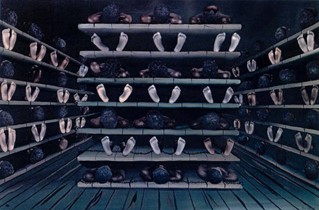
African Religious and Ritualistic Practices and Music (Continued)

Conditions of Enslaved Africans in a Slave Ship
Unlike the Israelites in Babylon centuries before, however, the enslaved Africans were born and nurtured in an environment where the most profound, most cathartic expression was made manifest in song, rhythm, and body movement. At first, the verbal utterances that came out of their newfound environment were fervent emotional shouts and moans, in which melody, rhythm, and expression were more important than words.
Shackled in iron and bearing the scars of a thousand cruel whips, they managed to sing the Lord's song in a strange land. "Endowed by African skills and attitudes, he took his misery and grief, his brutal treatment and towering obstacles, and wove them into new songs and melodies (Lovell 1972, 63)."
Not yet fluent in their captors' language or spiritually ready to adopt that language as their own, enslaved Africans required a new linguistic medium to communicate their commitments to God, each other, and the spirits. Just as Africans before slavery had come together in counterclockwise-movement dance rituals to worship the gods and commune with each other, ethnically diverse Africans in America now employed the same practices to form their new tribal identity as African Americans (Jones 1993, 6). The anguish of oppression expressed through these various moans, cries, and hollers, accompanied by the rhythm of their feet, hands, and other body movements, reflected the bondage of the human spirit and the resilience and plight of enslaved and disinherited people.
For their part, the American slave owners felt good about their slaves' singing, they even found that slaves who sang were the happiest, and assuredly, it seemed to have helped them work harder and faster. It is undoubtful that a slave owner would cast his highest bid on a stronger voice. Slave owners often used slaves as entertainment. What else could account for minstrelsy? However peculiar or gratifying these sounds may have been to the listener, they were indeed earnest petitions to the Creator of all things. They summoned the spiritual forces and the powers of the universe to intervene in their plight. Once a joyous and prideful people, now, shackled, beaten, and forced to work in the most extreme and inhumane circumstances, not surprisingly some enslaved Africans even wished for death. At the root of America are the genocide of the Native Americans and the Africans' enslavement, indelible sins that still haunt her to this very day.
Ayantoyese Onifade
A society without drum is engrossed in bitterness.
Amadou Hampaté Bâ
If you want to understand Africa, it is necessary to account for religion-I am not saying Islamic, Christian, or Jewish religion-I am saying religion that is faith.





